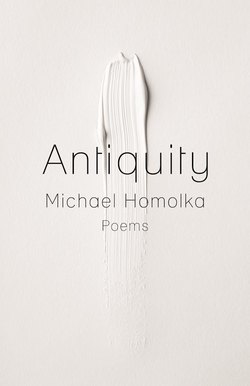Читать книгу Antiquity - Michael Homolka - Страница 7
На сайте Литреса книга снята с продажи.
ОглавлениеIntroduction
The book you are holding in your hands is called Antiquity, and it’s filled with poems as new as April crocuses. Or as old as April crocuses, for as John Berger points out, if poetry sometimes speaks of its own immortality, it has nothing to do with individual genius, but with the fact that poetry “abandons itself to language, in the belief that language embraces all experience, past, present, and future.” The poems in Antiquity very much abandon themselves to language, to the collective poetic endeavor, and they do so in a rich, textured, and sustained voice, though out of a self that is “flexible in its adherence / to a particular time period.” Hence a poem set at the mall but written after Martial, hence “Napoleon off / at boarding school,” hence “Listen Up Medusa,” hence “He who had pretended to be dead / pops up out of the cart.” Like a crocus, we could say. What’s antiquity anyway but a thing that is always lurking beneath the surface, not only in the sense of its influence—then shaping now—but in the sense our now will so soon be a then.
And so: could be Goshen, land of the Israelites, could be Goshen, New Jersey. We have our floods, our epidemics, our wars. “Each of us seems convinced he is the sole member of the family running home from the battle at Marathon bearing / good news We have fought bravely and survived.” Of course no one survives, but the book’s subjects—history, paintings, language—are things that have survived thus far, to the extent we are tempted to ask a question: History, paintings, language, what else is there? Personal experience, that constantly decaying thing? Homolka addresses the question, slyly eschewing experience in more than one poem, slyly hanging onto it in others. Nonetheless, the experience of the reader cannot be denied—if we read at all it is to have an experience—even if that experience is no more (or no less, depending on your view) than to catch the light and “sit and discuss / the reflections.” And what if this book, by virtue of its intelligence and in spite of its exhilaration, leaves us with a sense of spiritual weariness; what if the book leaves us wanting to be gladder and more puffed up? Consider most of all that if such wishes were granted, we wouldn’t have these marvelous poems, poems that remind us how easy it is, really, to talk to Horace.
—Mary Ruefle, 2015
